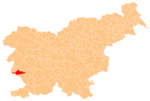Anton Mahnič: Difference between revisions
authority control moved to wikidata |
Janezdrilc (talk | contribs) m cat |
||
| Line 41: | Line 41: | ||
| PLACE OF DEATH = |
| PLACE OF DEATH = |
||
}} |
}} |
||
{{DEFAULTSORT: |
{{DEFAULTSORT:Mahnič, Anton}} |
||
| ⚫ | |||
[[Category:Slovenian Roman Catholic bishops]] |
[[Category:Slovenian Roman Catholic bishops]] |
||
[[Category: |
[[Category:Slovenian philosophers]] |
||
[[Category:Christian philosophers]] |
[[Category:Christian philosophers]] |
||
| ⚫ | |||
[[Category:Bishops of Krk]] |
|||
[[Category:Roman Catholic activists]] |
[[Category:Roman Catholic activists]] |
||
[[Category:People from Komen]] |
[[Category:People from Komen]] |
||
| Line 51: | Line 52: | ||
[[Category:1850 births]] |
[[Category:1850 births]] |
||
[[Category:1920 deaths]] |
[[Category:1920 deaths]] |
||
[[Category:Slovenian Servants of God]] |
|||
Revision as of 01:59, 17 September 2015
This article includes a list of references, related reading, or external links, but its sources remain unclear because it lacks inline citations. (February 2013) |

Anton Mahnič, also spelled Antun Mahnić in Croatian orthography (14 September 1850 – 30 December 1920), was a Slovene Roman Catholic bishop, theologian and philosopher, founder and the main leader of the Croatian Catholic movement.
Biography
Mahnič was born in Kobdilj near Štanjel in the Austrian County of Gorizia and Gradisca (in today's Slovenia). He finished theological studies in Vienna and then worked as a priest and a teacher in Gorizia. During this period, he became actively involved in the Slovene political life, criticising the liberal Catholic current within the Slovene national movement.
In 1896, he became Bishop of Krk (Croatia). In his bishopric he initiated many religious societies and activities, and started Catholic publishing, including a magazine for Christian philosophy called Hrvatska straža. He founded Catholic student magazines and societies all over the Austro-Hungarian Monarchy. He wrote many articles and works in the theological, philosophical, esthetical and political area. Later Mahnić initiated a Pius society, with its weekly newspaper Jutro. These groups of Catholic intellectuals, gathered around these papers, joined together in the Croatian Catholic movement) before the First World War. After the War, Mahnić was persecuted during the Italian occupation, and he went to Zagreb, where he died.
Mahnić's main goal was defending and promoting Catholic faith and its moral principles in Croatian public and social life, which were endangered by liberalization and secularization. Also important issue for him was spiritual and intellectual education of the youth.
See also
- Janez Evangelist Krek
- Ljubomir Maraković
- Ivan Merz
- Ivan Protulipac
- Josip Srebrnič
- Josip Stadler
- Ivan Tavčar
Sources
- Bozanić, Antun: Biskup Mahnić. Pastir i javni djelatnik u Hrvata, Zagreb – Krk, 1991
- Krišto, Jure: Hrvatski katolički pokret (1903–1945), Zagreb, 2004, ISBN 953-6258-64-1
- Krišto, Jure: Prešućena povijest. Katolička Crkva u Hrvatskoj politici 1850–1918, Zagreb, 1994, ISBN 953-169-046-4, ISBN 978-953-169-046-1
- Sinjeri, Josip: "Biskup Antun Mahnić i Hrvatski katolički pokret", Riječki teološki časopis, Rijeka, 15 (2007), 2 (30), 551–587

